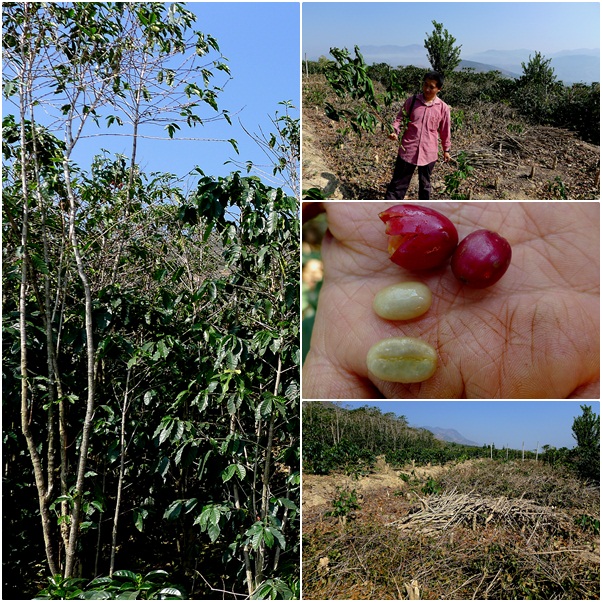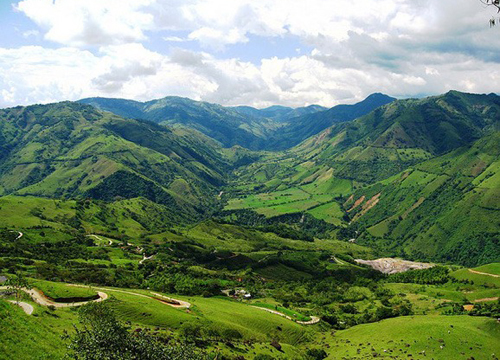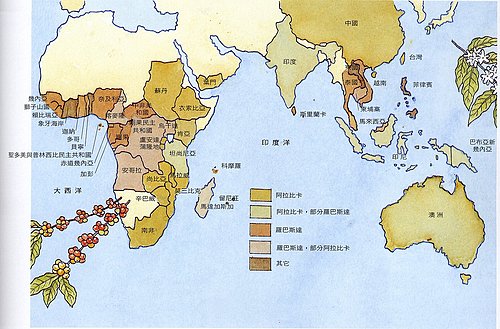Yunnan small grain coffee the history of Yunnan small grain coffee
Coffea yunnanensis
Taste: Yunnan Arabica coffee entrance, first taste a trace of sweet bitterness, nose is full of a similar floral coffee aroma, on both sides of the tongue there is a trace of sour, continue to taste, sour will spread to the cheeks, but very light very quiet, if you like to drink a little stronger coffee, then there will be temples and heart powerful throbbing, exciting. Drink Yunnan small coffee, it is best not to add sugar, it is not bitter, and sugar will cover up the original aroma and sourness of coffee. And this is the characteristic of Yunnan small grain. But you can add a little creamer, smooth and fragrant. Geography: Yunnan Arabica coffee is one of only two kinds of coffee produced in China, and the other is produced in Hainan, and the yield is not large. Yunnan coffee, grown at an altitude of 1000 to 1400 meters frost-free period of the longer plateau mountains, if the altitude is too high, sour taste, too low bitter taste. Arabica coffee is mostly planted at an altitude of 1100 meters.
Dry hot valley area. Long growing season, slightly barren soil, pure air, plenty of sunshine. Such coffee, full fruit, unique flavor, absolutely green products. The most unique coffee beans are Yunnan Arabica coffee beans, which are slightly smaller than the general Abuela coffee beans, so they are called Yunnan Arabica coffee. However, at present, some estates have improved their varieties, and some normal-sized coffee beans are produced. This coffee bean has better aroma and taste, but it still uses the name Yunnan Arabica coffee. As far as I know, 70% of the composition of Nestle instant coffee is Yunnan Arabica beans, one is cheap, the other is because Yunnan Arabica aroma is sufficient, bitter light, slightly sour reasons. History: 1892,
French missionary Father Tian
A place called Zhu Kula in Yunnan has successfully tried to grow coffee. Up to now, there are still 24 coffee trees growing in Zhukula Township, which are more than 90 years old.
Zhukula Coffee Forest in Zhukula Village is a mysterious, legendary and beautiful natural village, belonging to Zhukula Village Committee of Pingchuan Town, Binchuan County, Dali Prefecture. It is located on the bank of Yupao River, a tributary of Jinsha River. This is the junction of Dali Prefecture, Chuxiong Prefecture and Lijiang City. More than 100 years ago, Zhu Kula was called "Ruoke Lai"(Yi language), which means curved mountain road. In 1892, due to the arrival of French missionary Father Tian, the essence of Yi language and French romance were combined, so there was the name Zhu Kula, which later generations translated as "heaven on earth".
Article from Baidu

Important Notice :
前街咖啡 FrontStreet Coffee has moved to new addredd:
FrontStreet Coffee Address: 315,Donghua East Road,GuangZhou
Tel:020 38364473
- Prev

Brazilian Coffee Industry Brazilian Coffee production areas learn about Brazilian Coffee Industry
Coffee industry in Brazil Coffee is a traditional industry in Brazil. Since 1960, coffee cultivation in Brazil has been ranked first in the world, with an average annual output of 24.6 million bags (60 kg each). In 2002, due to favorable weather and a good year for coffee production, Brazilian coffee reached the best level in history, reaching 47.2 million bags, an increase of 59.6 per cent over 28.137 million bags in 2001. According to the United States Department of Agriculture 20
- Next

The basic knowledge of Coffee beans the three native species of coffee Robsta species Arabica species Libby
Basic knowledge of coffee beans (1) Coffee belongs to the evergreen shrub of the genus Rubiaceae, which is centered in the tropics. There are about 6000 species of Rubiaceae belonging to 500 genera. Coffee has always been thought to have certain effects, such as strengthening the stomach, waking up the brain, stopping bleeding, dissipating heat, strengthening the body, and so on. The more famous Rubiaceae plant is Gardenia jasminoides, whose fruit was dried and used as medicine a long time ago.
Related
- Guji coffee producing area of Guji, Ethiopia: Humbela, Shakiso, Wulaga
- What is the most expensive variety of Qiloso in BOP multi-variety group?
- How to store the coffee beans bought home?
- Why are Yemeni coffee beans so rare now?
- Ethiopian Sidamo all Red Fruit Sun Sun Santa Vini Coffee beans
- SOE is mostly sour? What does it mean? Is it a single bean? what's the difference between it and Italian blending?
- Is Italian coffee beans suitable for making hand-brewed coffee?
- How to choose coffee beans when making cold coffee? What kind of coffee beans are suitable for making cold coffee?
- Just entered the pit to make coffee, what kind of coffee beans should be chosen?
- Can only Japan buy real Blue Mountain Coffee? What are authentic Jamaican Blue Mountain coffee beans?

